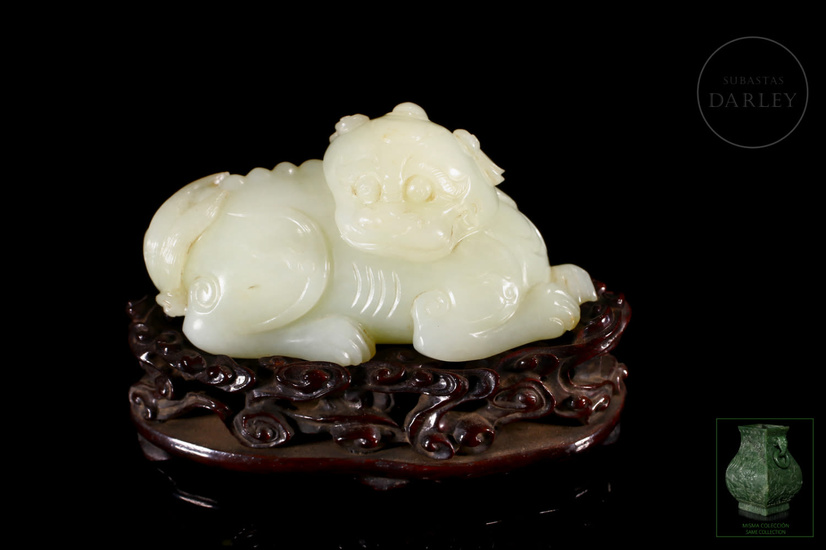Carved white jade figure,"Lion" Qing Dynasty
Carved white jade figure,"Lion" Qing Dynasty
A white jade carving in the form of a 'Chinese lion'. The figure of the animal is well depicted, lying on its paws with its head tilted upwards to the right. The face has a serene and calm expression, with large eyes and thick tufts of hair hanging from its rounded ears, just below which grows its long mane. The lion's body is in a resting position, with its tail standing still on its hindquarters. Its back is marked by the line of its rounded vertebrae, which ends just below its bushy tail.
The form of the "lion" or beast in ancient Chinese myths and legends is derived from the transliteration of ancient Sanskrit. Images of these figures are depicted on ancient textiles, belt buckles, seals, bells or buttons to ward off evil spirits. In the southern dynasties, stone statues were often found in front of tombs for the same reason. Carved oval wooden pedestal. Qing Dynasty (1644–1912).
Size: 5 x 4.95 cm x 9.67 cm; Weight: 313 gr
Provenance: Current French private collection. -Previous owner of lot: 92, (Carved spinach green jade vase, Qing dynasty) Auction: Asian Art Auction 29 December 2022. Darley Auctions.
View it on
Sale price
Estimate
Time, Location
Auction House
Carved white jade figure,"Lion" Qing Dynasty
A white jade carving in the form of a 'Chinese lion'. The figure of the animal is well depicted, lying on its paws with its head tilted upwards to the right. The face has a serene and calm expression, with large eyes and thick tufts of hair hanging from its rounded ears, just below which grows its long mane. The lion's body is in a resting position, with its tail standing still on its hindquarters. Its back is marked by the line of its rounded vertebrae, which ends just below its bushy tail.
The form of the "lion" or beast in ancient Chinese myths and legends is derived from the transliteration of ancient Sanskrit. Images of these figures are depicted on ancient textiles, belt buckles, seals, bells or buttons to ward off evil spirits. In the southern dynasties, stone statues were often found in front of tombs for the same reason. Carved oval wooden pedestal. Qing Dynasty (1644–1912).
Size: 5 x 4.95 cm x 9.67 cm; Weight: 313 gr
Provenance: Current French private collection. -Previous owner of lot: 92, (Carved spinach green jade vase, Qing dynasty) Auction: Asian Art Auction 29 December 2022. Darley Auctions.



